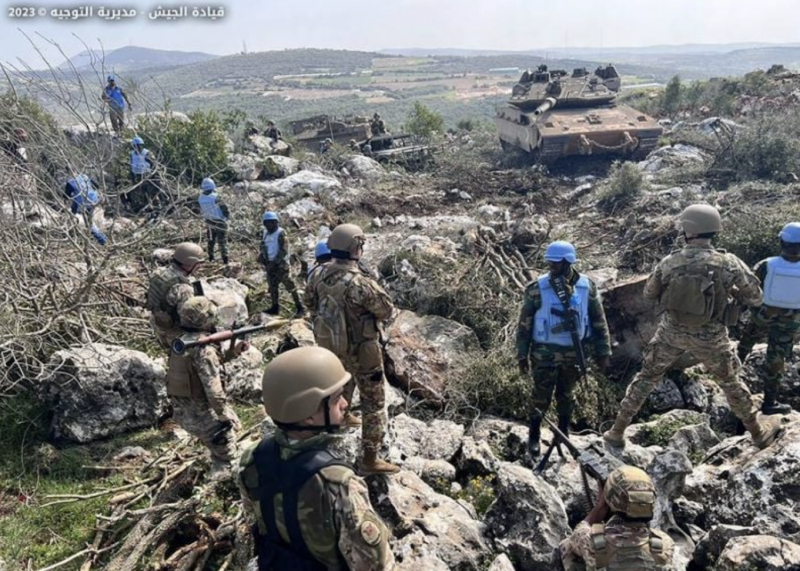
Face-off between Lebanese soldiers and Israeli tanks, separated by UNIFIL peacekeepers, Mar. 5, 2023. (Credit: The Lebanese Army)
The Lebanese Army is deployed in southern Lebanon amid cross-fire but seems to be absent from the landscape. Since the beginning of the conflagration on the front, the army has kept a low profile, only evacuating the dead and wounded. This is a self-imposed mission, given its problematic position in the conflict unleashed by Hezbollah in support of Gaza.
The military institution had to make a difficult choice. On the one hand, it had to comply with the political watchword, as Outgoing Prime Minister Najib Mikati had declared that the decision on war and peace was not in the hands of his government. At the same time, the army had to respect the Taif Accords, which provided for "the adoption of all necessary measures to liberate all Lebanese lands from Israeli occupation.”
A clause enshrined in successive ministerial declarations legitimizes resistance, but only in defense of eminently Lebanese interests. This is why Hezbollah included the issue of Israel's occupation of Lebanese territory in its rhetoric justifying its participation in the fight against Israel, although it links this to support for the Palestinian cause.
These paradoxes led the army to adopt a minimalist mission in southern Lebanon.
Another major reason for the army's neutrality is that its main backers — the United States and Qatar — are working towards a settlement of the conflict, and would not look kindly on the involvement of the military institution in a war that does not concern Lebanon.
Voluntary silence
During the 2006 war, the army regularly communicated on military operations. This time around, it has opted for silence. It only made a statement on the Dec. 5 incident, in which one Lebanese soldier was killed and three others were "accidentally" wounded by Israeli fire. It has made no further statements.
Several analysts think this position is intended to demonstrate that the army is not directly involved in this conflict. It is also a way of protecting its men — some 4,000 soldiers deployed south of the Litani River — from Israeli fire.
"The army's message is certainly one of neutrality in this conflict. But the lack of communication is not convincing," said General Khalil Helou, a former officer. He stated that Israel has not targeted the army to date, let alone the United Nations Interim Force in Lebanon (UNIFIL).
"The army could at least have explained that, if it did not retaliate after the incident in December and the firing on Lebanese civilians, it was to comply with UN Resolution 1701 and its peacekeeping role,” he added.
The army is doing its best not to obstruct Hezbollah's movements as the battle rages in the south, without facilitating its action or helping it in its operations. Even if it wanted to, could the army have countered this militia without running the risk of alienating the party's base and risking a confrontation with its supporters, or even civil war?
“One thing is certain: The troops have been mobilized for some time, hand on the trigger, to counter the possibility of a ground invasion by the Israeli army,” said a source close to Hezbollah.
A military strategist added anonymously that this attitude is "perfectly normal and provided for by the law of defense. In this case, it would be defending Lebanese territory and not a foreign cause.”
This balancing act is made more delicate because they must now lay the foundations for their future mission. Soon, the army will be called upon to deploy in force in the south, as envisaged in the roadmaps prepared successively by the French and the American envoys, but above all by 1701.
What about Hezbollah?
The army does not currently have the means — both financial and logistical — to carry out its tasks as expected, said Defense Minister Maurice Slim a week ago. It lost many of its personnel due to the economic crisis and needs funds to be able to recruit or recall reservists.
"The army can initially count on some 15,000 reservists [this figure was mentioned in Resolution 1701, based on an assessment by the Lebanese government] who can be mobilized to serve for six to seven years … except that they have to be paid the necessary salaries," explained Helou.
The conference to support the army was initially scheduled for Feb. 27 in Paris, but was postponed "after the truce negotiated in Gaza collapsed," a European diplomatic source told L’Orient-Le Jour. “It will be put back on the agenda as soon as the ceasefire is declared,” the source added.
Meanwhile, Army Chief Joseph Aoun visited Italy last week, where he met his Italian, Spanish, German, British and French counterparts. It was an opportunity for the head of the institution to "explain the needs of the troops and the challenges they face,” as a source close to the command said.
Even if it is equipped with sophisticated weaponry, "the Lebanese army will never be able to strike a balance with the capabilities held by Israel,” said researcher Hassan Qotob. But to Helou, that is not the point. "The army's mission will continue to be peacekeeping, as stipulated in 1701, and not combat. Consequently, it only needs military vehicles and greater deployment," he noted.
The difficulty lies in knowing to what extent the Lebanese soldiers — whose competence and capabilities have never been called into question — will be able to carry out their task. Will Hezbollah facilitate their mission once a ceasefire agreement is reached? What scenario will the party accept, and will it agree to "withdraw" or at least "keep a low profile" in the region south of the Litani?
This article was originally published in L'Orient-Le Jour.